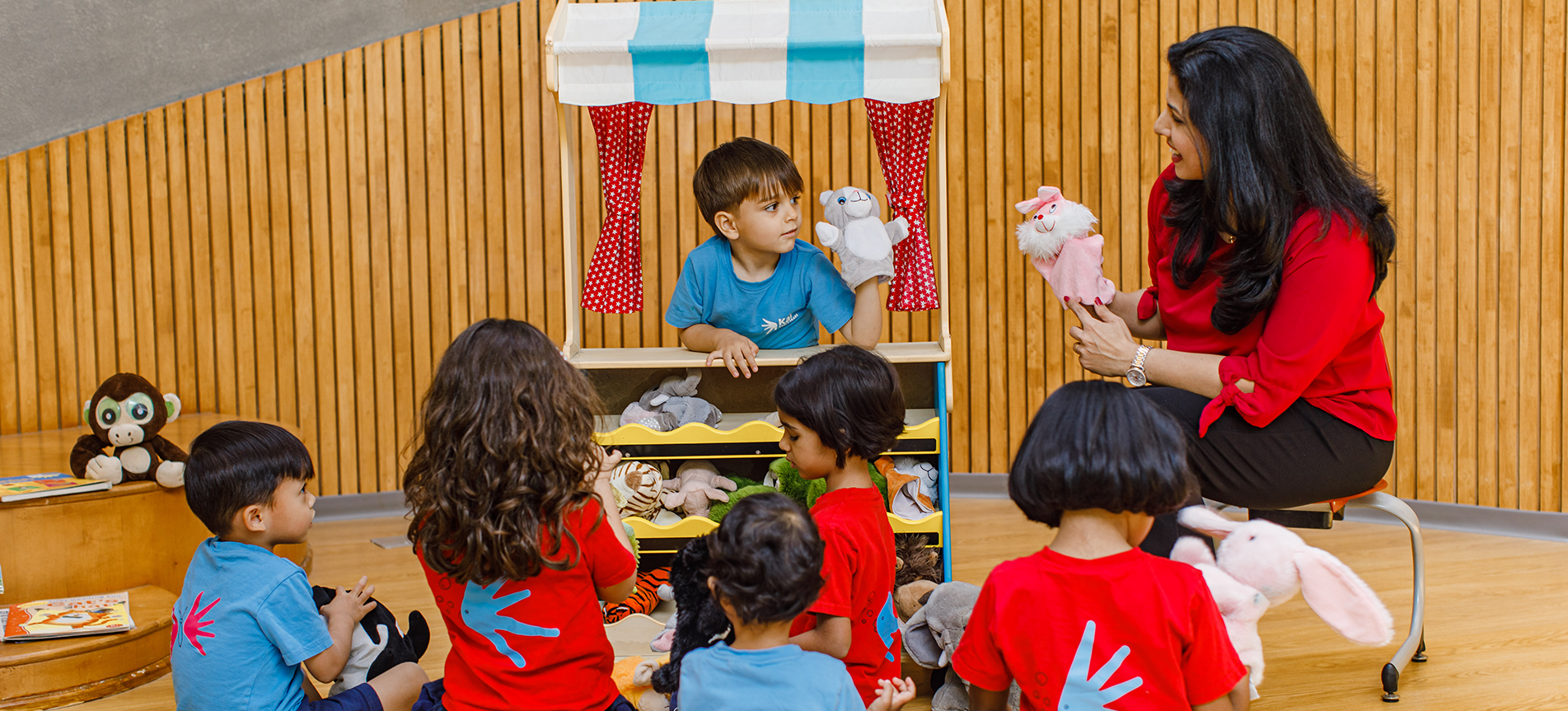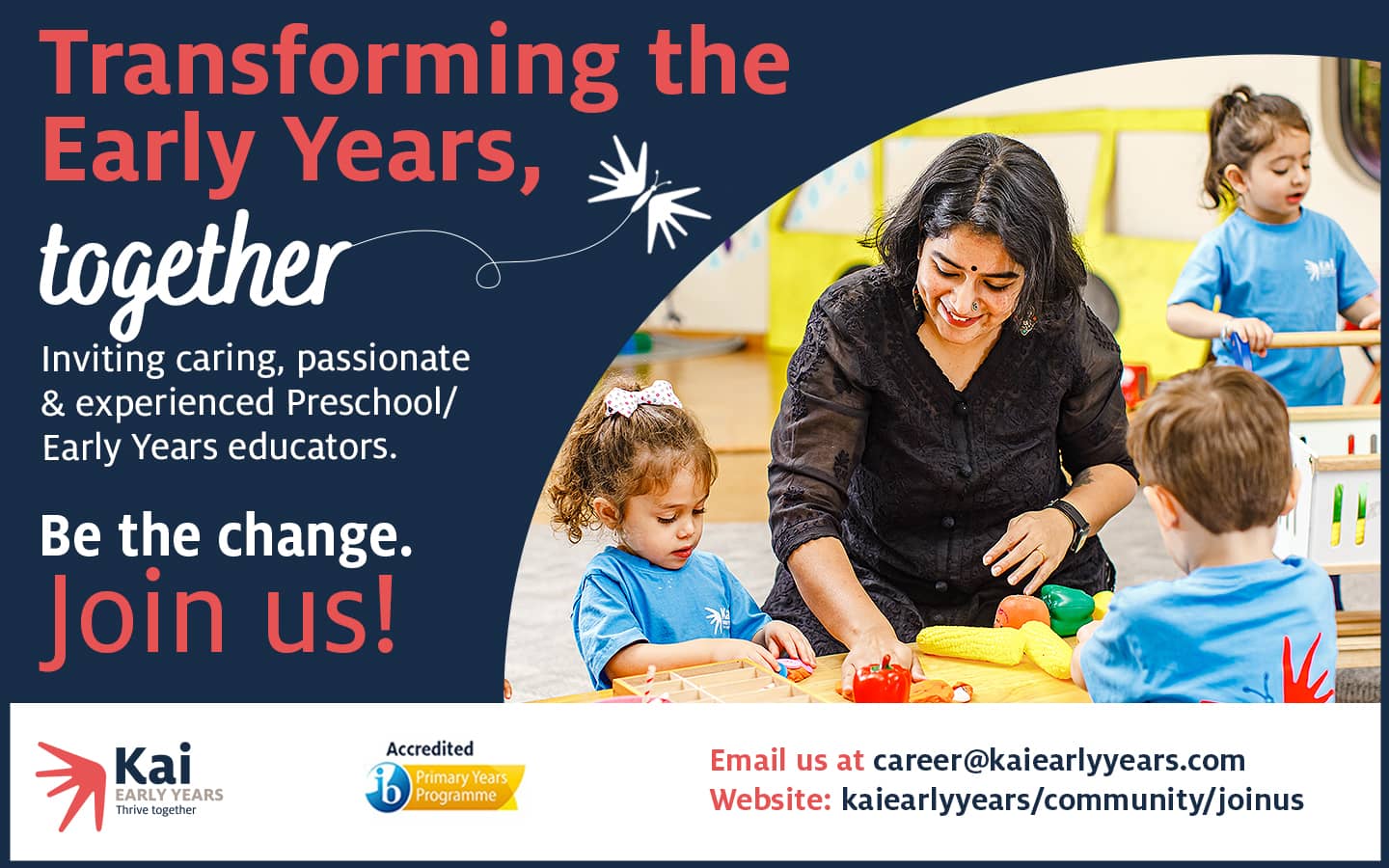K1: Ages 4 – 5 years
Timings: 8:00 am – 2:30 pm (Mondays – Fridays) || Teachers to Students Ratio: 1 : 12
Introduction
K1 at Kai is a year of transformation — where curiosity deepens into inquiry, independence becomes confidence, and play evolves into purposeful, self-directed learning. At this stage, children are eager to explore more complex ideas, ask deeper questions, and engage in meaningful collaboration with peers. Their growing attention span and ability to work in small groups allows for richer conversations, more focused tasks, and increasingly thoughtful reflections.
Structured routines and consistent expectations help children build focus, self-regulation, and confidence in navigating the classroom independently. Yet the environment remains vibrant and dynamic — full of movement, creativity, and moments of discovery.
In K1, learning is personalised — guided by each child’s interests, developmental readiness, and learning style. Educators observe closely and respond intentionally, offering materials, questions, and provocations that challenge and inspire. The learning pathway is flexible and child-led, ensuring that every learner feels capable, supported, and deeply engaged.
The IB Units of Inquiry
Units of Inquiry in K1 open up real-world ideas through meaningful, hands-on exploration. In “Relationships and Belonging,” children discover what makes each of us unique and how we come together as a community. In “Properties of Materials,” they explore the characteristics of different materials and investigate how things can be used, built, or changed. “Ways We Communicate” helps children understand how we express our thoughts, ideas, and emotions using different modes — from words and art to gesture and music. And in “Water as a Shared Resource,” they explore where water comes from, why it matters, and how we can use it responsibly.
Throughout these units, the IB Learner Profile comes to life as children develop into inquirers, communicators, caring friends, and reflective thinkers. They ask questions, make connections, and begin to take responsibility for their role in the learning community. Montessori learning in K1 evolves to reflect the growing capabilities of children at this stage. With stronger focus and longer work cycles, children begin engaging in more complex literacy and numeracy tasks within a carefully prepared environment. The materials they interact with now are designed to support abstract thinking, allowing them to build foundational skills in reading, writing, counting, and problem-solving through hands-on experiences.
Language work becomes more expressive and purposeful, while early math experiences encourage children to recognise patterns, understand quantity, and explore relationships between numbers. Montessori’s emphasis on choice, repetition, and self-correction allows each child to progress at their own pace, building confidence and independence along the way. This progression supports the broader goals of inquiry — helping children articulate ideas, represent their thinking, and make meaning of the world around them.
Physical Development
Children develop strength, balance, and coordination through movement games, outdoor exploration, and rhythmic activities. Fine motor control improves as they engage in daily tasks like tracing, cutting, spooning, threading, and writing. These experiences build physical confidence and prepare children for increasingly independent self-care, handwriting and academic tasks.
Numeracy
In K1, children’s mathematical thinking begins to take shape in deeper, more connected ways. Cognitive growth is supported through hands-on exploration, experimentation, and inquiry-based problem-solving, as children start to see patterns, make predictions, and explain their thinking. With growing memory, focus, and reasoning skills, they begin to understand that numbers, shapes, and measurements are tools for making sense of the world around them.
As part of our dual curriculum, numeracy is introduced both through Montessori materials and real-life provocations from the IB inquiry framework. Children explore number recognition, sequencing, and quantity using concrete, tactile resources that support conceptual understanding. They compare, sort, classify, and begin engaging with early operations such as one-to-one correspondence, combining groups, and understanding more/less. Measurement and spatial awareness are explored through playful tasks like building, pouring, estimating, and problem-solving with peers.
This balanced, thoughtfully scaffolded approach ensures children are not just “doing math,” but thinking mathematically — developing confidence, flexibility, and a foundation of understanding that prepares them for more formal numeracy in the years ahead.
Language Development
In K1, language learning deepens meaningfully as children begin to connect spoken and written words with greater confidence. They engage in rich discussions, express personal ideas, and are gently guided toward reading and writing through activities that are both structured and playful. With growing phonetic awareness, many children begin to write simple words and early sentences, while others explore storytelling through drawing, dictation, or dramatic play — all valid entry points into literacy.
Our dual curriculum ensures that children experience the rigour of early literacy development without losing the joy of discovery. The environment is carefully designed to meet each child where they are, offering a variety of pathways to reading and writing. Whether a child is blending sounds, building vocabulary through inquiry, or narrating stories in their own voice, language is always purposeful, personal, and empowering. This balanced approach ensures that literacy unfolds naturally — with stretch, support, and space to grow.
Social & Emotional Development
Children in K1 take greater ownership of their place in the community. They take on leadership roles, collaborate on shared tasks, and engage in discussions that build empathy, perspective, and social awareness. During Montessori work time and free play, mixed-age group interactions provide rich opportunities for mentoring and learning — where older children naturally support younger peers, reinforcing their own skills while practicing patience, compassion, and responsibility.
With teacher support, children learn to express emotions clearly, navigate social dynamics, solve conflicts peacefully, and respect others’ space, ideas, and feelings. This growing awareness of self and others builds not just emotional maturity, but also the confidence and adaptability they’ll carry into primary school and beyond.
Creative Development
Through music, dance, dramatic play, and open-ended art experiences, children explore ideas and emotions in imaginative ways. They engage in storytelling through various mediums, experiment with tools and materials, and use creative thinking to represent what they observe and understand. Freedom to explore and create supports both self-expression and cognitive flexibility.
Approaches to Learning
K1 children are guided to become intentional, independent learners. They learn to make choices, manage their materials, and reflect on their learning. They engage with multi-step activities, follow through with plans, and begin to ask more purposeful questions. These habits of mind — curiosity, persistence, and agency — are nurtured through a learning environment that encourages wonder, responsibility, and joyful self-direction. Opportunities like the Student-Led Conference allow children to share their learning journey in simple, meaningful ways, building confidence and ownership of their progress.
“We are thrilled to have found an outstanding campus in Bangalore for our daughter during our time here. She genuinely enjoys and looks forward to going to school each day. Kai’s indoor and outdoor environments speak for themselves, showcasing how well-equipped and spacious they are for young children to play and learn. The activities organized throughout the year help us create lasting memories and provide endless opportunities for growth. Additionally, having both the Montessori and IB-PYP programs is a true advantage. The team at Kai is warm, caring, and kind, and we are proud to be part of the Kai community.“
– Fouad & Lucy Chidiac (K1 Parents)
Your child’s day at Kai

